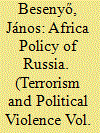|
|
|
Sort Order |
|
|
|
Items / Page
|
|
|
|
|
|
|
| Srl | Item |
| 1 |
ID:
166655


|
|
|
|
|
| Summary/Abstract |
We have heard ever more about the growing Russian presence in Africa in the past few years, which might appear strange for many people. Those, however, who know the history of the Black Continent, also know that Russian presence is not a new phenomenon. Africa was an important place during the Cold War where the Soviet Union not only competed with the United States of America, but also with China. For those who observed the robustly growing US and Chinese Africa policies, it could have appeared after the end of the classic Cold War, that the Russians had retreated beyond the borders of their country, abandoning the Black Continent in favour of their previous rivals. However, it did not happen, because the Russians did not close their diplomatic missions as they did in the former socialist countries of Eastern Europe. Furthermore, the Russians played a key role in UN Peacekeeping Missions in Africa, where they provided the necessary Air Transportation Capabilities together with the Ukrainians. Today it is becoming obvious that not only a new form of the Cold War has been resumed between the West and Russia but also the fact that the Russian “retreat” was only temporary. The relations with African countries are becoming increasingly important not only for the Russians, but also for the Africans, who need no longer choose between the American and the Chinese way of development. Even though the US and China did not view Russia as a competitor in the recent past, taking into account the events of the past few years the situation has changed. We also need to see that Russia—similarly to China—is primarily a competitor to US great power interests. China intends to cooperate with Russia, rather than competing, whilst not denying the existence of competition between the two countries. I would like to give a picture of this process in my study, including the changing balance of powers in Africa.
|
|
|
|
|
|
|
|
|
|
|
|
|
|
|
|
| 2 |
ID:
100075


|
|
|
|
|
| Publication |
2010.
|
| Summary/Abstract |
This article explores the phenomenon of military naming, that is, the act of giving a name to military practices such as military operations, weaponry, and military units. The basic theoretical supposition is that military naming is a simple and useful mechanism that might be employed to blur undesired aspects-such as the human and economical costs-associated with the respective practices. Inspired by John B. Thompson's ''strategies of operation of ideology,'' the research uses the construct of strategies of annihilative naming to analyze a corpus of 239 Israeli names of military operations and weaponry. By using names coming from nature and the Bible, the Israeli military uses three strategies-naturalization, euphemization, and legitimation-that mediate Israeli public opinion toward controversial military operations as well as weaponry development. Future research of other military names will support the construction of generalizations about this important phenomenon.
|
|
|
|
|
|
|
|
|
|
|
|
|
|
|
|
|
|
|
|
|